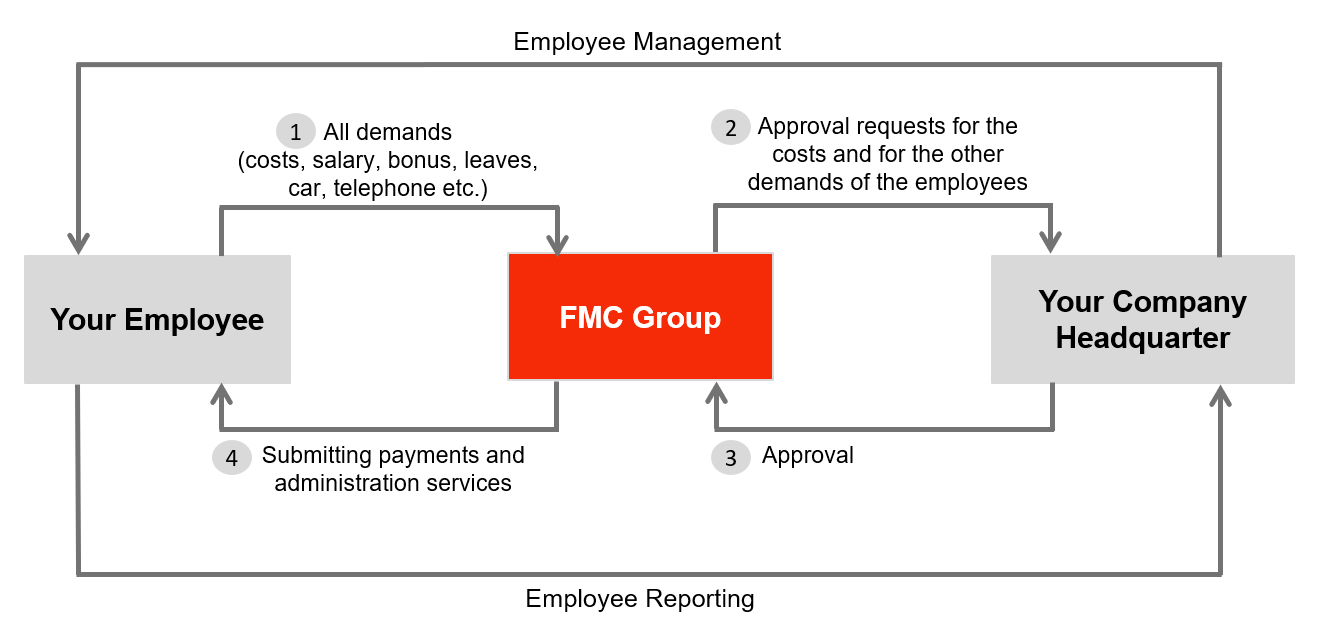
Employer of Record China
Our Employer of Record China service enables clients to hire employees without the need to operate a local legal entity there.
It makes a big difference to develop a new market with your own personnel on the ground. Particularly for functions related to sales & marketing, business development, distributor management, and service & maintenance, our customers are very satisfied using our China Employer of Record Service.
Our customers and their local teams can be free of the distractions of administrative tasks and complex local requirements. So you can fully focus on the development of your core business.
If your local business grows large enough, you can easily transfer the employees to your own subsidiary. It also provides a quick exit strategy if necessary. In addition to Croatia, we offer Employer of Record services in several other countries.
Content:
- Employer of Record China – FMC Group’s Approach
- Hiring an Employee
- Income Tax
- Typical Benefits
- Visa for the Employees
- Time off Policies
- Terminating an Employee

Get in touch with us

Employer of Record China - FMC Group's Approach
- Quick, flexible, and easy entry into China in compliance with local employment laws
- Complete control over business development with your own team
- Good option for building up, managing, and supporting your distributors and key accounts by directly observing local developments and adjusting the strategy whenever necessary
- Using our comprehensive recruitment experience for international clients, we can form a local team that fits your corporate culture.
- Focusing on your core business instead of dealing with the time-consuming and complex local administrative tasks
- Allowing for easy market exit if necessary
- Integrating your employees into our team through motivational events and special meetings
EOR China Management & Reporting Flow

Hiring an Employee
Employment Contract – indefinite vs. fixed term
Employment laws and regulations in China apply to both domestic and foreign workers, albeit with some variations in benefits and entitlements. A formal, written employment contract is obligatory for all full-time employees in China, with three main types:
- Fixed-term contract: This contract lasts for a specified duration.
- Non-fixed term contract: This agreement has no definite expiration period.
- Project-based contract: Employment ends upon project completion.
The Chinese government provides all citizens and residents with basic health insurance. Additionally, many organizations offer supplementary insurance benefits. Employees are also entitled to retirement, health, unemployment, disability, and maternity benefits during their employment, as stipulated by The Labour Law, The Social Security Law, The Work Safety Law, and The Union Law.
Probation Period
In accordance with employment laws in China, it is compulsory to establish a probationary period for both domestic and foreign employees. However, the maximum duration of this probationary period varies depending on the terms outlined in the employment contract. Employment arrangements based on fixed assignments typically do not include a probationary period.
| Duration of Employment Contract | Probation Period |
| 3 months to 1 year | 1 month |
| 1 to 3 years | 2 months |
| Fixed-term contract of 3 years or more | 6 month |
Work Week, Overtime & Maximum Working Hours
China adheres to a standard five-day working week, with a maximum of 8 hours per day or 44 hours per week. Typically, companies operate from 8 am to 6 pm, including a one-hour lunch break. Overtime is strictly regulated in China, with a monthly limit of 36 hours, except in emergency situations.
Compensation for overtime is mandated as follows:
- For regular workdays: 150% of the standard hourly rate (referred to as ‘time and a half’).
- For rest days: 200% of the standard hourly rate, or a compensatory day off (known as ‘double time’ or a ‘day in lieu’).
- For statutory holidays: 300% of the standard hourly rate (‘triple time’).
Income Tax
As of January 1st, 2019, China has implemented adjustments to tax brackets and residency rules aimed at alleviating the tax burden on individuals with lower incomes. Additionally, new special additional deductions are now accessible for resident taxpayers.
| Gross Income | Tax rate % |
| 0-1500 | 3 |
| 1501-4500 | 10 |
| 4501-9000 | 20 |
| 9001-35000 | 25 |
| 35001-55000 | 30 |
| 55001- 80000 | 35 |
| Above 80000 | 45 |
Typical Benefits
For Chinese nationals, social security benefits are provided through the “five insurances” practice in China. These encompass health insurance, pension, worker’s compensation, maternity benefits, and unemployment insurance.
In China, the 13th month salary is a standard bonus granted to employees at the conclusion of the year, a practice widely adopted throughout the country.
Additional benefits, such as housing support, are determined by the income tax bracket of individual employees. China’s housing fund system enables Chinese employees to accumulate funds for purchasing their own homes, thereby facilitating social security and stability for local workers in the country.
Visa for the Employees
In China, there are eight types of visas available.
Visa Type Z is designated for applicants and their accompanying individuals who are preparing to commence employment in China. Employers can acquire Visa Type Z from municipal or provincial labor authorities.
Time off Policies
Public Holidays
There are 7 public holidays in China:
- New Year’s Day
- Spring Festival / Chinese New Year / Lunar New Year’s Day
- Qingming Festival (Tomb-Sweeping Day)
- Labor Day (1st May)
- National Day (1st October)
- Mid-Autumn Festival
- Dragon Boat Festival
Annual Leave
In China, employees are entitled to receive 5-15 days of paid leave based on their length of service with the company.
| Number of Years | Minimum Annual Leave (Days) |
| Less than 1 | 0 |
| 1 to 10 | 5 |
| 10 to 20 | 10 |
| More than 20 | 15 |
Sick Leave
Employees in China are entitled to a range of 3 to 24 months of paid medical leave to address health issues and undergo treatment, with the duration determined by the length of their tenure with the company. Sick pay should not fall below 80% of the local minimum wage.
For injuries or illnesses sustained during work, workers’ compensation provides legal entitlements for up to one year of leave at full pay to undergo medical treatment.
To ensure receipt of full wages, employees must furnish their employer with a valid medical certificate from a certified doctor.
Other Leave Types
In China, female employees are entitled to 98 days of paid maternity leave. They can commence this leave within 15 days prior to childbirth. Additionally, depending on the city, women aged over 24 are typically granted an extra 30 days for their “late maternity leave.”
Traditionally, women receive full pay during their maternity leave, either through social security or provided by their employers. Legal protections exist to prevent the termination of women while pregnant or breastfeeding a newborn child.
Paternity leave regulations vary significantly by location but generally do not exceed 14 days.
Terminating an Employee
Every company operating in China must be familiar with the termination rules and regulations. Non-compliance can lead to penalties, required employee payments, and potential reinstatement of terminated employees.
According to these regulations:
- Employers are required to provide a notice period of 30 days to terminated employees.
- If an employee’s contract is terminated during the probationary period, the company should provide a notice period of 3 days to the employee.
Disclaimer: Although we carefully researched and compiled the above information, we do not give any guarantee with respect to the actuality, correctness, and completeness.
